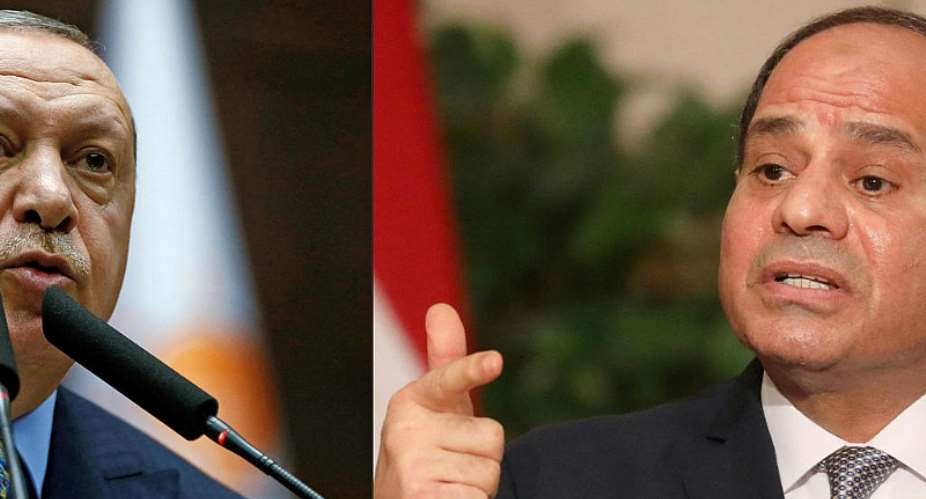Turkey and Egypt have started diplomatic talks to restore ties frozen since the 2013 military coup that ousted President Mohamed Morsi. Analysts predict such a rapprochement could have repercussions across the north African region, but Morsi's supporters could end up paying the heaviest price.
Turkish foreign minister Mevlut Cavusoglu announced that Egypt had agreed to high-level diplomatic talks in Cairo due to start in early May. The bilateral discussions are the first since the 2013 ousting of Egyptian President Mohamed Morsi, a close ally of Turkey's Recep Tayyip Erdogan.
Huseyin Bagci, head of Turkey's Foreign Policy Institute, says Ankara's initiative is an attempt to counter growing isolation.
"There is an increasing bloc, increasing antipathy towards Turkey, Turkey cannot go on like this, Israel, Egypt, Saudi Arabia, United Arab Emirates it is too much," warned Bagci.
"It's not what Turkey intended to actually achieve; Turkey intended to become the leader, the regional player. Now only Qatar is supporting Turkey, and Qatar is not enough," he added.
Soft words, hard feelings
Last year, Cairo further turned up the pressure on Ankara, signing a deal with Athens to explore potential energy sources in Mediterranean waters contested by Greece and Turkey. But conciliatory Turkish words towards Cairo will not be enough to ensure a diplomatic breakthrough.
"Ultimately whether this new turn is going to be effective and deliver results does hinge on what Turkey does," said Sinan Ulgen, head of the Istanbul-based Edam Research Institute.
Ankara's support of the Muslim Brotherhood in Egypt or, as it's called in Arabic, Ikhwan, which was ousted from power in 2013 by the current President Fattah el-Sisi, remains a crucial point of tension between the countries.
"Egypt right now is acting against Turkey just because of the Turkish government's policy based on the theological background," said regional analyst Cem Gurdeniz. "When Turkey leaves the religious policy, I am sure Turkey-Egypt relations will be better."
Erdogan, who has Islamist roots, strongly backed Morsi and publicly wept over the Sisi-led crackdown on Morsi's Muslim Brotherhood supporters. The Turkish president, to this day, continues to use the finger "Rabbia" symbol used by the Muslim Brotherhood and Sisi opponents at public rallies.
Egyptian opposition established in Turkey
Istanbul has become a center for Egyptian opposition television, broadcasting by satellite into Egypt. The Turkish city is also a base for many leading Muslim Brotherhood members. But, in a sign of Turkey's rapprochement with Egypt, there are increasing reports Ankara is starting to impose restrictions on opposition tv broadcasts. Speaking to reporters, Turkish foreign minister Cavusoglu appeared to confirm those reports.
"There are some opponents to whom we addressed the necessary warnings, especially those who exaggerate the extremist rhetoric against Egypt," declared Cavusolgu in April.
Analysts predict the price of Egyptian rapprochement will mean Erdogan will have to make painful concessions.
"Egypt is getting stronger with all the support it receives from all over the world, and Turkey is getting more and more lonely, and this is the problem of the Turkish government, I would say," said Bagci.
"Tayyip Erdogan and Sisi probably will not shake hands as presidents in the foreseeable future, but Turkey will not be supporting the Muslim Brotherhood as before," he added.
With Egypt and Turkey backing rival sides in the recent Libyan civil war and competing for influence in Sudan, analysts suggest a Turkish-Egyptian rapprochement could ease regional tensions. But difficult diplomatic talks are being predicted to lie ahead, given the recent animosity and distrust between the two sides.





 We’ll no longer tolerate your empty, unwarranted attacks – TUC blasts Prof Adei
We’ll no longer tolerate your empty, unwarranted attacks – TUC blasts Prof Adei
 Bawumia donates GHc200,000 to support Madina fire victims
Bawumia donates GHc200,000 to support Madina fire victims
 IMF to disburse US$360million third tranche to Ghana without creditors MoU
IMF to disburse US$360million third tranche to Ghana without creditors MoU
 Truck owner share insights into train collision incident
Truck owner share insights into train collision incident
 Paramount chief of Bassare Traditional Area passes on
Paramount chief of Bassare Traditional Area passes on
 Two teachers in court over alleged illegal possession of BECE papers
Two teachers in court over alleged illegal possession of BECE papers
 Sunyani: Victim allegedly shot by traditional warriors appeals for justice
Sunyani: Victim allegedly shot by traditional warriors appeals for justice
 Mahama vows to scrap teacher licensure exams, review Free SHS policy
Mahama vows to scrap teacher licensure exams, review Free SHS policy
 Government will replace burnt Madina shops with a new three-story, 120-store fac...
Government will replace burnt Madina shops with a new three-story, 120-store fac...
